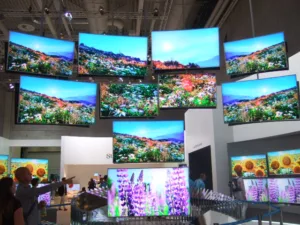In a timely call-back to the Volkswagen emissions scandal, independent lab testers have accused Samsung of implementing a similar system on its TVs in Europe.
The unpublished tests were performed by an EU-funded group called ComplianTV. They recorded energy consumption rates that were ‘significantly higher’ in real-world situations than in official test conditions.
Samsung TVs at IFA 2015Samsung’s ‘motion lighting’ feature was found to lower the sets’ brightness – and, thus, power consumption – under international electrotechnical commission (IEC) test conditions. These conditions involve the playback of fast sequences of varied content.
For its part, Samsung has strongly denied any wrongdoing. It says that the feature is not designed to fool tests and cannot be classified as a ‘defeat device’. Screen brightness is reduced in response to numerous types of real-world content, including fast-moving sports and action films, as well as during slower content like weather reports.
A spokesperson said, “There is no comparison [between motion lighting and VW defeat devices]… This is not a setting that only activates during compliance testing. On the contrary, it is an ‘out of the box’ setting, which reduces power whenever video motion is detected. Not only that, the content used for testing energy consumption has been designed by the International Electrotechnical commission to best model actual average picture level internationally”.
However, no reductions in power consumption were registered under real-world conditions.
“Samsung is meeting the letter of the law but not the spirit of the law”, Rudolf Heinz, project manager of ComplianTV’s product lab, told the Guardian, which originally covered the issue.
The European Commission has said that it will investigate any allegations of cheating in tests. It has also committed to tightening energy efficiency regulations to outlaw the use of ‘defeat devices’ in consumer products.
According to the Guardian, several EU states have complained about the problem. These include the Swedish Energy Agency, which said in a letter to the European Commission:
‘The Swedish Energy Agency’s Testlab has come across televisions that clearly recognise the standard film (IEC) used for testing… These displays immediately lower their energy use by adjusting the brightness of the display when the standard film is being run. This is a way of avoiding the market surveillance authorities and should be addressed by the commission’.
According to the Guardian, the UK made a similar report to the Commission three years ago. The report said, ‘The purpose seems to be to pass the peak luminance measurement test and then reduce luminance (and power) to get a better energy label ranking when the on power is measured… All very clever and it is not dimming so much that it makes a huge difference, but does the commission consider this an acceptable practice or is this a non-compliant activity?’ The Commission did not respond.
Finally, the Guardian said that research by the USA’s National Resources Defence Council has found, “a curious anomaly with one manufacturer’s TVs”, according to Noah Horowitz – director for energy efficiency standards.

